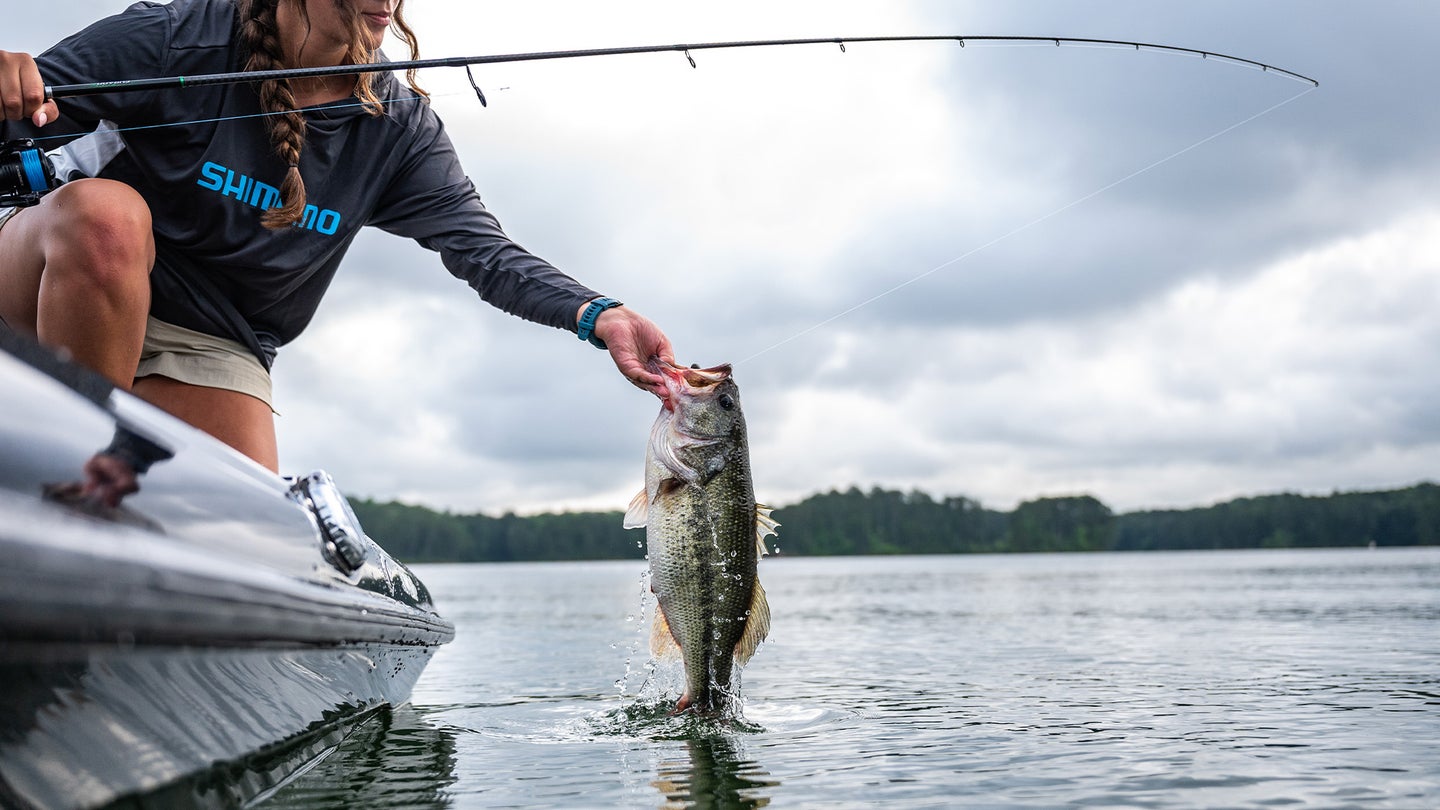6 Tips To Prepare for Post Spawn Bass Fishing

Finesse-style baits and subtle presentations are very effective on post spawn bass. Shimano
The post spawn has a reputation for being one of the most difficult times of year to catch bass. Largemouths are worn out from spawning and are often docile and downright dazed. But this doesn’t mean they are impossible to catch this time of year—you just need to change tactics. There are little areas of activity, key baits to throw, and certain things to look for that can lead to fantastic post spawn bass fishing.
I like to think of the post spawn fishing period as spotty rather than difficult. Don’t get me wrong, post spawn fishing conditions are definitely tougher than the best days of the spawn, but you can still catch bass. Once you key in on what to look for and specific post spawn techniques, you’ll start landing more fish. Below are six post spawn bass fishing tips to help you locate fish, dial in baits, and land big bass.
Bass will often seek refuge in shaded areas during the post spawn. G. Loomis
Post Spawn Bass Fishing Tips
1. Find the shade
As the spawn winds down, shade becomes an essential component to look for. Bass like to tuck beneath bushes, docks, boats, mats, and whatever other overhead cover they can find when coming off beds. This is, at least in part, so they can recuperate. The spawning process is grueling; fish are exhausted from defending beds, adjusting to rising water temps, and are heavily pressured by anglers. They need a break and often use heavy cover for a few days to get their fins back beneath them.
Post spawn bass will also hang around shady cover because of fry. Clouds of tiny baby bass, or fry, can be found hanging close to shady cover right after the spawn. In an odd twist, the mothers who spawned these fry often turn on them as soon as they hatch. Male bass stay close by to fend off the mothers and other predators, but this behavior lends to opportunistic fishing around cover.
2. Fish finesse style baits
Finesse presentations like wacky rigs, Neko rigs, and dropshots all shine during the post spawn. Remember, many bass, especially the big females, are often finicky in the post spawn. Slowly and carefully picking apart cover that’s near a spawning area with a finesse presentation is a great way to get a bite from a big post spawn female.
A wacky rig is perhaps the best of these finesse presentations in shallow because it skips so well. As I just pointed out, bass like shady areas during the post spawn. Few baits can get back into these areas of tight shade better than a wacky rig. Don’t sleep on the capabilities of a dropshot or Neko rig either, especially if you can find shade produced by bridge pilings, deep sea walls, and docks.
Finesse-style baits like ned rigs and dropshots work very well during the post spawn. Shimano
3. Also go big
Before you tell me that this tip is contradictory to the last one, let me say that big baits can be just as effective as finesse presentations during the post spawn. The mid-size lures like chatterbaits, lipless crankbaits, squarebills, and spinnerbaits that worked well during the pre spawn take a backseat during the post spawn. Now, small presentations and big baits are the ticket.
Large glidebaits, for example, are great lures to use in the post spawn. These baits have slow, sweeping actions that seem to hypnotize lethargic bass and lure them out of shade and cover. They also come across as a large threat to bass fry, triggering defensive males to attack. Big baits can even lure cannibalistic mothers to turn from finger foods to a bigger meal.
4. Target bait spawns and insect hatches
As the bass spawn winds down, shad, herring, bluegill, and other baitfish begin to spawn. Further into the post spawn, you even start to see mayflies, cicadas, and other insects hatching. These hatches and spawns are often localized, concentrating several fish into small areas. If you’re fortunate enough to stumble onto a shad spawn early in the morning, you’ll likely experience a very exciting half-hour of fishing. These feeding frenzies often see dozens of bass crashing on thousands of shad as they feverishly work up and down cover, trying to lay eggs. Throw a swim jig, buzzbait, or spinnerbait into the mix and wait for an aggressive bite.
5. Look for cover in deep water
If there’s not a lot of shallow, shady cover in the area where you’re fishing, look to the first cover you can find in deeper water. Bass are cold-blooded creatures. This means that their environment has a huge effect on their bodily functions, as well as their moods. As lethargic as bass can be in cold water, hot water can make them just as moody. When the spawn is winding down, the water is warming up. Some bass look for reprieve in the shade, while others head straight for deep, cool water.
If you’ve ever dove into a lake on a summer day, you know that the water a few feet down is substantially colder than the water along the surface. Bass know this, too, so they make their way from the spawning flats and pockets out to the first cover they can find in deeper water. This may be a brush pile in 15 feet, the first rocky drop in 20 feet, or the base of a dock post in 10 feet of water. Look for deep cover close by to intersect early post spawn bass as they move off beds. Try large Texas-rigged worms, shakyheads, crankbaits, and dropshots to pluck them out.
6. Find and use the current
Bass also gravitate towards current for many of the same reasons they like shade and deeper water—it’s cooler. Current stirs up water, mixing the colder, deeper water with shallower, warmer water. Moving water also doesn’t warm as fast as stagnant water. For these two reasons, areas with current typically have cooler water shallower than areas without current. And, current typically means more oxygen in the water as well.
It’s a good idea to run up rivers and creeks in search of the swiftest waters you can find. Throwing spinnerbaits, topwaters, and Flukes into these areas can produce bites. You can also find lots of current and good fishing below dams during the post spawn. Along with cooler water and increased oxygen levels, current also positions bass in slack areas where they can wait for a meal to wash by. Insert your crankbait, swimbait, or flutter spoon into the equation and hold on.
Moving water, like streams and creeks, are excellent places to find post spawn bass. Piotr Wawrzyniuk/Adobe Stock
Keep Fishing During the Post Spawn
Though post spawn bass fishing is thought to be tough, it doesn’t have to be. You won’t be able to load the boat on every bank, but there are certain elements to look for that can make for some of the best fishing you’ll experience all year. You can often pattern bass in shallow shade or a little deeper around the first off-shore cover you can find. And using both big and small baits seems to work better than the average size lures.
Lastly, focus on specific locations. Whether it’s a stretch of bank that has several bluegill beds on it, a hundred-yard patch of grass with a shad spawn or mayfly hatch, or the uppermost reaches of a fishery where the lake turns to river rapids. These isolated locations concentrate fish for one reason or another and produce several bites. Take these tips out to your local fishery and unlock the jaws of the post-spawn bass in your area.
The post 6 Tips To Prepare for Post Spawn Bass Fishing appeared first on Field & Stream.
Articles may contain affiliate links which enable us to share in the revenue of any purchases made.
